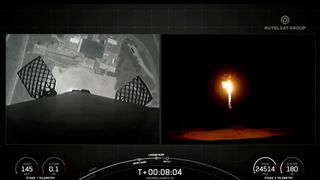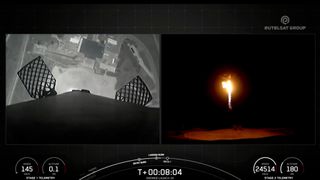SpaceX sent a set of internet satellites to orbit for another company early Sunday morning (Oct. 20).
SpaceX launched the last batch of Eutelsat OneWeb’s V1 satellites from California’s Vandenberg Space Force Base atop a Falcon 9 rocket on Sunday at 1:13 a.m. EDT (0513 GMT; 10:13 p.m. on Oct. 19 local California time).
The Falcon 9‘s first stage returned to Earth as planned, touching down at Vandenberg’s Landing Zone 4 about eight minutes after lifting off. It was the seventh launch and landing for this particular booster, according to a SpaceX mission description.

The Falcon 9’s upper stage continued hauling the 20 satellites to low Earth orbit. It will deploy them over a 20-minute span, starting 59 minutes after liftoff, if all goes to plan.
Related: SpaceX launches 40 OneWeb internet satellites to orbit, lands rocket
Eutelsat OneWeb’s most recent launch with SpaceX, on May 20, 2023, brought the company’s constellation to 634 satellites. At the time, Eutelsat OneWeb said the new batch of 16 satellites would be enough to take their services global.
“OneWeb is on track to deliver global coverage this year and is already in the process of scaling services for customers around the world,” company officials stated at the time. (The company was then known as OneWeb; the merger with Eutelsat occurred in September 2023.)
“With the addition of the satellites deployed from this launch, OneWeb will increase the resiliency and redundancy in the constellation as it expands services to its growing base of enterprise and government customers.”
Previous to that effort, SpaceX sent three sets of OneWeb satellites aloft in sets of 40 spacecraft each.
RELATED STORIES:
SpaceX’s agreement to launch Eutelsat OneWeb satellites dates to March 2022, after the latter company pivoted from an agreement to use Russian-built Soyuz rockets through the French company Arianespace.
Shortly after Russia’s unsanctioned invasion of Ukraine, Russian federal space agency Roscosmos said it would not launch 36 OneWeb satellites then mounted on a Soyuz rocket unless the company met two conditions.
Those conditions were that the spacecraft would not be used for military purposes, and the United Kingdom would divest itself from the company’s investors. OneWeb did not accede and the Soyuz was rolled off the launch pad at the Roscosmos-operated Baikonur Cosmodrome in Kazakhstan, replete with the satellites.



